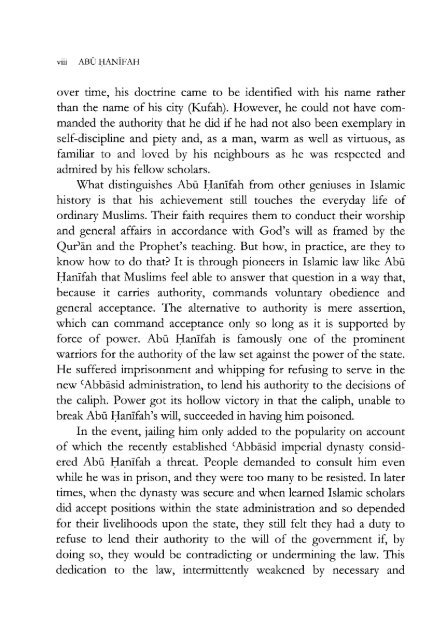You also want an ePaper? Increase the reach of your titles
YUMPU automatically turns print PDFs into web optimized ePapers that Google loves.
Vlll<br />
ABO I:IANIFAH<br />
over time, his doctrine came to be identified with his name rather<br />
than the name of his city (Kufah). However, he could not have commanded<br />
the authority that he did if he had not also been exemplary in<br />
self-discipline and piety and, as a man, warm as well as virtuous, as<br />
familiar to and loved by his neighbours as he was respected and<br />
admired by his fellow scholars.<br />
What distinguishes <strong>Abu</strong> I:Ianifah from other geniuses in Islamic<br />
history is that his achievement still touches the everyday life of<br />
ordinary Muslims. Their faith requires them to conduct their worship<br />
and general affairs in accordance with God's will as framed by the<br />
Qui>an and the Prophet's teaching. But how, in practice, are they to<br />
know how to do that? It is through pioneers in Islamic law like <strong>Abu</strong><br />
I:Ianifah that Muslims feel able to answer that question in a way that,<br />
because it carries authority, commands voluntary obedience and<br />
general acceptance. The alternative to authority is mere assertion,<br />
which can command acceptance only so long as it is supported by<br />
force of power. <strong>Abu</strong> I:Ianifah is famously one of the prominent<br />
warriors for the authority of the law set against the power of the state.<br />
He suffered imprisonment and whipping for refusing to serve in the<br />
new cAbbasid administration, to lend his authority to the decisions of<br />
the caliph. Power got its hollow victory in that the caliph, unable to<br />
break <strong>Abu</strong> I:Ianifah's will, succeeded in having him poisoned.<br />
In the event, jailing him only added to the popularity on account<br />
of which the recently established cAbbasid imperial dynasty considered<br />
<strong>Abu</strong> I:Ianifah a threat. People demanded to consult him even<br />
while he was in prison, and they were too many to be resisted. In later<br />
times, when the dynasty was secure and when learned Islamic scholars<br />
did accept positions within the state administration and so depended<br />
for their livelihoods upon the state, they still felt they had a duty to<br />
refuse to lend their authority to the will of the government if, by<br />
doing so, they would be contradicting or undermining the law. This<br />
dedication to the law, intermittently weakened by necessary and














